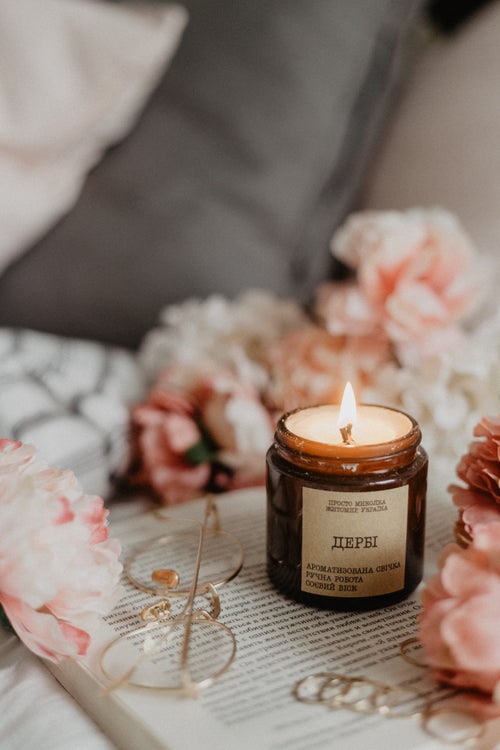With the smell of falling leaves, pumpkin spice, apple cider and more, candles are making their way to many homes – and that number will only increase as we inch closer to the holiday season.
The answer to the question “Why do we love candles?” may seem simple. The cheesy answer is that a flickering candle symbolizes hope in the darkest of hours. This isn’t totally wrong.
Candles are often known for their soothing, healing properties, which is why they are often used by therapists. They create a cozy atmosphere, as the slow flicker and gentle glow helps ease and soothe the mind. However, the comfort of candles may be nice, but it doesn’t quite answer the question of why.
In 2016, Scientia Pharmaceutica used an electroencephalograph to record brain activity when smelling candles. The research “clearly revealed that fragrances significantly modulate the activities of different brain waves and are responsible for various states of the brain. Further, a number of studies have scientifically supported the beneficial use of various aromatic plants in aromatherapy.”
The scientific term for this would be olfactory aromatherapy. When you inhale oils and scents, the molecules enter the nose and stimulate olfactory receptors there, which are then activated by different odor molecules. This complexity of receptors and how they interact with smell molecules are what allow us to detect different smells.
Sensory neurons carry signals to the olfactory bulb, which process the scent, and the brain detects this action through the limbic system. This is the emotional area that plays a key part in creating new memories associated with past experiences. Scents also cause the limbic system to release neuro messengers including serotonin and endorphins, which produce mild effects of relaxation and happiness. The limbic system is why we feel happy memories & positive emotions at the same time
Certain scents can be more appealing because of a memory attached to them. This isn’t just an idea, it’s actually the way our body works.
“Smell and memory seem to be so closely linked because of the brain’s anatomy,” said Venkatesh Murthy, Harvard’s Life Sciences Professor and chair of the Department of Molecular and Cellular Biology. Scent, emotion and memory are inexplicably intertwined.
For example, a candle with coffee and geranium may be appealing if you’ve taken a trip to France, as it gives off the scents of a Parisian terrace. For me, my favorite candles come from Magic Candle Company, because of its many scents based on iconic locations around the Disney Parks.
Candles have a long history from all around the world, from the ancient Egyptians’ use of aromatherapy scents to cure disease, to Greek books on the healing properties of essential oils, to the major source of light in homes, workplaces and communities.
A Japanese tradition emerged in the 1980s which takes full advantage of the stress-relieving properties of pine with a therapeutic walk. This is called shinrin-yoku: to take in the atmosphere of the forest. Research shows that a 15-minute shinrin-yoku per day decreases hostile thoughts and eases depression.
But the smell of pine isn’t the only scent that has specific properties activated through the limbic system.
“It is scientifically proven that scented candles can play an essential role in the physiological effects of mood, stress, working capacity, and overall mental health,” Chryssa Chalkia, an accredited clinical integrative psychotherapist and cognitive behavioral therapist, said.
Lavender eases the mind and relieves stress, stabilizes mood and is used as a natural remedy to treat insomnia and improve sleep quality.
Ylang ylang promotes feelings of joy and ease. University Hospital from Universidade de São Paulo proved this significantly alters self-esteem perception.
Rose geranium improves mental functions and uplifts spirits. This is often recommended for those suffering with anxiety and depression.
The consistency of burning candles also has a positive effect on mental health, because it enhances the experience of relaxation, especially if done when in a relaxing state.
With more than 10,000 different scents in the U.S. for use in wax flickers, candles bring people all over the world joy, no matter how you are feeling or what you want. So pull out a candle, and enjoy its strong, relaxing and healing properties.
Sources: https://litupcandleco.com/blogs/get-lit/benefits-from-burning-candles https://www.travelandleisure.com/style/shopping/benefits-of-candles https://theflowerpot.la/blogs/happenings/health-benefits-of-candles https://forhabibi.com/blogs/article/ten-features-of-scented-candle-that-make-everyone-love-it https://petitsrituels.com/blogs/petits-rituels-blog/the-scientific-benefits-of-aromatherapy-candles





